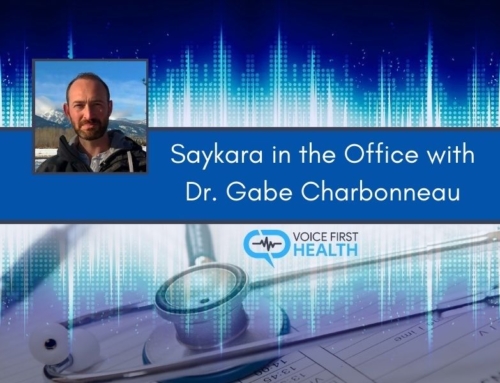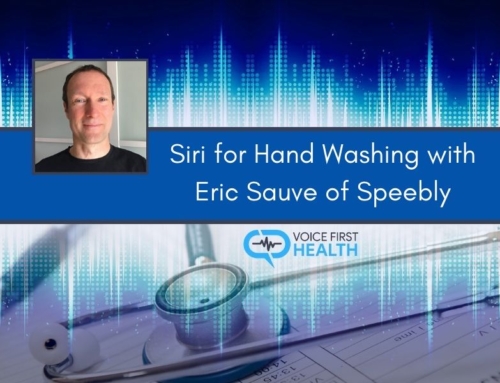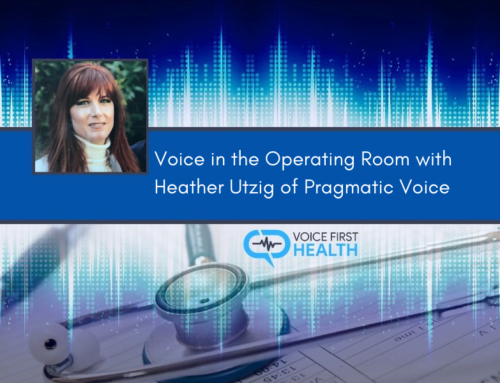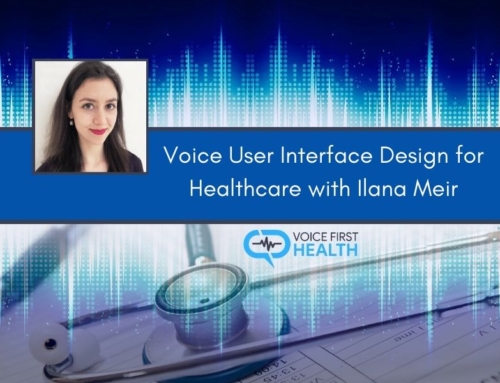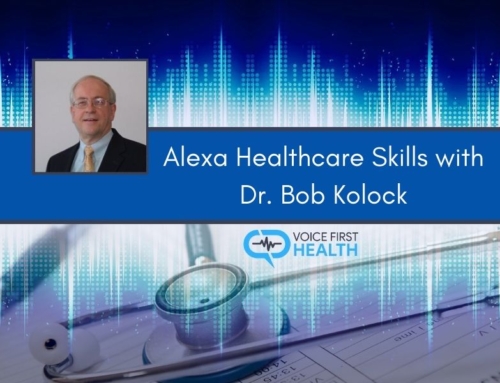VFH Episode 34
In this episode, Teri reached out to a number of key influencers in the voice-first health space to get their thoughts on the recent announcement that Alexa is HIPAA compliant.
Alexa healthcare skills created by industry leading healthcare providers, payers, pharmacy benefit managers, and digital health coaching companies are now operating in a HIPAA eligible environment. In the future, Amazon will enable developers to take full advantage of this capability.
Key points!
- Amazon recently announced that Alexa is now HIPAA Compliant and this will impact the voice-first health space in profound ways.
Current HIPAA-Compliant Alexa Healthcare Skills
- Express Scripts – focuses on home delivery of prescriptions.
- Cigna Health Today – allows eligible employees to manage their personalized wellness incentives.
- My Children’s Enhanced Recovery After Surgery (ERAS) – This is by Boston Children’s Hospital and it allows parents and caregivers of children to provide their care teams with updates on recovery after surgery.
- Swedish Health Connect – It allows customers to find an urgent care center near them and schedule appointments.
- Atrium Health – allows North and South Carolina residents to find urgent care locations near them and schedule same-day appointments, find out about opening hours, and current wait times.
- Livongo Blood Sugar Lookup – allows members to look at some of their diabetes care plan parameters like last blood sugar readings, blood sugar measurement trends, and other AI insights.
Nathan Treloar of Orbita
- He is the president and co-founder of Orbita.
- Alexa becoming HIPAA-Compliant is big news for his company and the healthcare industry.
- Orbita provides a secure platform for creating voice-enabled virtual assistants for the healthcare industry. They offer HIPAA-Compliant virtual assistants for web and mobile chat, and custom devices, but have not been able to do the same for Alexa skills yet.
- Their clients and partners always ask about HIPAA for Alexa. They had been waiting for the Alexa HIPAA compliance announcement for 3 years.
- Now they can go beyond the general health information services and symptom checkers that are the standard of healthcare applications in the skill store, and build much more personalized health information applications that provide highly contextual guidance and support.
Bianca Phillips
- She is a lawyer and looks at the implications of voice technology on digital health lawmaking.
- She is the founder of the Electronic Health Consulting Group.
- She is excited to hear that Alexa has achieved HIPAA compliance which means that the new healthcare skills are going to benefit patients.
- She believes that the next big issue surrounds digital health companies considering the present day and future uses of their data and data rights. Data rights are tied to a person’s sense of security so it is critical to developing trust. It’s going to involve companies looking at past lawmaking and private decision making in the area of data ownership, to help them understand the historical challenges of data ownership and aid their development moving forward. That would signal real digital health leadership.

Dave Kemp
- He is one of the foremost thought leaders in hearables and how voice technology is affecting, influencing and being incorporated into hearables.
- He is a part of Oak Tree Products, a company that provides medical supplies and devices to the hearing technology industry.
- He feels that the Alexa HIPAA-Compliant news is one of the most important developments in the whole voice technology space, not just in the healthcare setting. The compliance needed to happen for voice technology to be implemented into the healthcare setting in a meaningful way.
- There will be numerous possibilities, like linking your wearable data to Alexa so that you can ask Alexa about the type of data that is being recorded. There are going to be some very interesting use cases.
- Patients, healthcare providers, and all of the different entities that work in-between the patients and healthcare providers are going to benefit.
Heidi Culbertson
- Heidi Culbertson Interview – Alexa in Canada Episode 27
- She is the founder and CEO of Ask Marvee, a company that is devoted to providing voice applications/voice skills to help the aging population maintain their independence in their home.
- She feels voice is still in its infancy and HIPAA protection is very important. She sees the Alexa HIPAA compliance as a starting point to address privacy and personal health information. It’s also a recognition and validation of the huge impact voice can have across all the many healthcare touch points in hospitals and homes.
- It’s a huge opportunity for innovation and partnership amongst health organizations and third-party development and design shops.
Dr. Neel Desai
- He is the co-founder of MedFlash Go, Alexa’s first interactive medical question bank for medical students.
- He feels Alexa’s HIPAA compliance will be a great thing for patients and healthcare teams, as it will reduce a lot of friction and allow for what is most important – communication between healthcare teams and patients, which will make it easier to reduce errors, save time and make it easier for healthcare teams to make sure patients are compliant with their medications.
- It will also be helpful for patients to communicate as far as they are having problems with medications and things that get lost with constant telephone calls back and forth.
Stuart Patterson
- Stuart Patterson Interview – Voice First Health Episode 21
- He is the CEO of Lifepod Solutions. Lifepod is all about creating pro-active voice (meaning the voice technology can initiate the interactions) for supporting elderly living in various homes or trying to maintain independence in their own homes and using these devices as a true assistant in their lives.
- He doesn’t think Alexa’s recent HIPAA compliance announcement is a breakthrough because Nuance has offered HIPAA-Compliant voice technology for years, particularly for in-hospital voice-first use cases like dictation, transcription and data entry into EHR. Those are the most obvious and cost-effective use cases for voice in the healthcare market, as long as its reactive voice only.
- He feels having a HIPAA version of Alexa definitely benefits the voice-first market overall because Amazon is a leader in the voice market. Alexa use cases in healthcare, however, are like all of the other virtual assistant services done so far. They are in a self-service model, and they exclusively use a reactive voice mode where the user speaks and the service tries to respond.
Timon LeDain
- Timon LeDain Interview – Voice First Health Episode 8
- He is the Director of Emerging Technologies at Macadamian Technologies, and they help providers and healthcare organizations to create innovative healthcare related skills, for example, voice-enabled healthcare plans like the Diabetes Care Plan.
- They were thrilled to learn that Amazon had released their HIPAA-Compliant Alexa skills kit. The compliance will unlock opportunities with organizations which demand HIPAA-Compliant end-to-end solutions and Macadamian had been waiting for this before exploring voice opportunities in earnest.
- They have developed workarounds in the past to achieve compliance with the healthcare-related Alexa skills they released previously, but they still didn’t get around Amazon’s terms of service which prevents any personal health information to be captured via an Alexa skill.
- Companies like Macadamian were working in the grey with their early adopters while they waited for Amazon to address the compliance.
- They now anticipate significant new business coming from pharma and medtech companies, for their omnichannel digital health platform as a service.
- They look forward to seeing voice play a larger role now in the digital transformation of the healthcare industry, and new digital therapeutic solutions under development today.
Dave Isbitski
- He is the Chief Evangelist of Amazon Alexa, keynote speaker, podcaster, and voice designer.
- Alexa’s HIPAA compliance is currently in private beta.
- It will enable patients and healthcare providers to get and track information easily.
- He is excited about the future, and what the compliance means for the healthcare industry.
- He is excited to see the skills that people will build.





